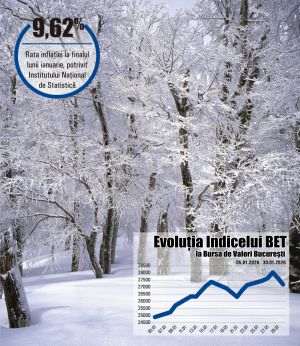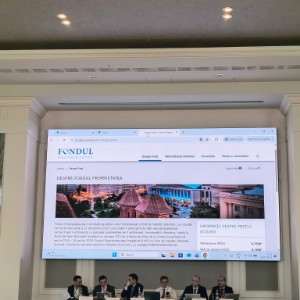The editorial office of BURSA has enquired on the position of the authorities and of the officials of the capital market on two controversial issues, tied to the ongoing Secondary Public Offering of Petrom.
The two questions that we have sent them are printed below:
1) Article 189 of the Law 297/2004 stipulates that a maximum price must be set for the shares in the Offering, if the latter doesn"t include the price and the number of shares offered; even though it does not meet the requirements of this article of the law, because the number of shares of "Petrom" was not stipulated in the Secondary Public Offering, the latter nevertheless sets a maximum price.
What is your opinion on this inadvertence?
2) The Code of the Bucharest Stock Exchange (BVB) stipulates that the subscriptions of the Public Offering need to be recorded in the system of the BSE for the duration of the Offering; however, the Consortium of intermediaries of ongoing public offering of "Petrom" does not enter the subscriptions in the system of the BSE.
What is your opinion on this irregularity?
We hereinafter publish the reply of the CNVM, stating that we have asked it an additional question, to make sure that the CNVM has allowed the advertising of the secondary public offering.
Naturally, we will take the liberty of commenting on the answers, according to our convictions.
• THE ANSWER OF THE CNVM
Following your enquiry, we hereby submit to you several clarifications concerning the secondary public offering for the shares issued by SC OMV Petrom SA:
1. Clarifications concerning the dispositions of art. 189 paragraph (1) of the Law no. 297/2004 in the context of the public offering for the sale of shares issued by SC OMV Petrom SA
According to the legal provisions of Romania and of the European Community (Directive 2003/71/EC concerning the prospectus, Law no. 297/2004, CNVM Regulation no. 1/2006, EC Regulation 809/2004), a public offering needs to respect the rights of all the parties involved and to provide them with adequate information (seller and potential buyer). Thus, in the case of public sale offerings, the law requires the drafting and publication of a prospectus for the offering, a document which needs to contain relevant information on the issuer in question, the securities offered and the methodology of the public offering (payment, subscription, allocation etc.).
The object of the offering and the price at which it will be performed, are usually essential pieces of information, in the case of classic public offerings, as the price and the number of securities to be sold are expressly stipulated in the prospectus of the offering. Given the dynamic of the capital market, the European and Romanian lawmakers have anticipated the case when the price and the number of securities being offered would not be explicitly mentioned in the prospectus (art. 8 of the Directive 2003/71/EC, art. 189 of the Law no. 297/2004), and they are allowed to be set after the publication of the prospectus, by considering certain criteria and/or conditions stipulated in the contract.
According to the a fortiori principle, if the law allows for the price and the number of securities to be determined, this makes even more likely the situation where the price of the offering is the only one that can be determined; in this case, investors obviously have more certain data available than in the case where the price and the object of the offering could be determined.
2. Clarifications concerning the dispositions of art. 66 of the regulations of market operator S.C. BVB SA - Code of the Exchange in the context of the public offering for the sale of shares issued by SC OMV Petrom SA
According to the applicable legal provisions of Romania and of the European Community (Directive 2003/71/EC concerning the prospectus, Law no. 297/2004, CNVM Regulation no. 1/2006, EC Regulation 809/2004, Code of the BSE), the public offerings must be performed on the basis of a prospectus approved by the CNVM. The prospectus must include explicit provisions concerning the subscription methods, the payment and the allocation of the securities, in order to ensure that all investors are treated in a fair manner. Thus, the provisions of art. 66 of the Code of the BSE only apply when the system of the BSE is used for keeping track of subscriptions, and in any other cases the provisions of the prospectus will apply exclusively.
Given the importance of the public offering of shares in OMV PETROM, as well as the need to provide investors with a number of locations for subscribing as high as possible, the seller has opted to perform the offering through the brokerage firms of the consortium which intermediates the offering, as well as through a distribution group which includes lenders. As a result, the public sale offering will take place through entities that have direct access to the system offered by the BSE (participants in the BSE system), as well as entities that do not have access to the system of the market operator (credit institutions that are not certified as intermediaries). This leads to a situation where the system of the BSE can not be accessed by all the entities which the prospectus allows to record subscriptions. Thus, during the offer concerned, the logging of the subscriptions will be performed by the intermediation syndicate and will then be entered in the system of the BSE after the expiration of the subscription period to be allocated to investors, thus guaranteeing that investors which subscribe using the intermediaries and those who subscribe through the members of the distribution group are treated without discrimination. If the time that the subscription orders were recorded in the system of the BSE were used as the relevant moment to implement the "first come, first serve" principle, this would affect the equal treatment of investors because the members of the distribution group are not participants in the system of the BSE.
3. The CNVM has approved the promotional materials remitted by the Syndicate which intermediates the Offering.
Yours sincerely,
The Department of the Spokesperson
• COMMENT
The position of the CNVM on the two issues seems balanced and well thought out, and yet...
1. When it comes to the first question, the CNVM pushes the discussion into the specialized camp of law interpretation and uses a theoretical argument: "A fortiori rationae", which justifies extending the application of a norm to a situation which it does not cover, because the reasons behind implementing the norms in question are also present in this specific case.
The CNVM clearly explains that, since it is allowed to run a public offering without mentioning the number of shares, as well as without disclosing their price, then the offering is all the more compliant with the law when the price is the only unknown factor.
It seems logical.
But, since we"re getting into law interpretation, then we can invoke the rule (which is not just an argument): "Ubi lex non distinguit, nec nos distinguere debemus" (where the law does not make a distinction, we shouldn"t make a distinction either), since the idea of the Article 189 (1) of the law 297/2004 ("When the price and the number of securities which are offered to the public can not be included in the prospectus [...]) invokes just one condition, (not two), and that condition is conjunctive, and the conjunction is "non-distinct", because we are not talking about a conjunction - disjunction ("and/or", which the lawmaker had an option to use, if it had intended to do so), but it is instead a simple conjunction identical with itself and which can not be split under alternative conditions.
Leaving, however, the tedium of the theory, I find it more important to notice the truth: setting a maximum price of the Public Offering of "Petrom" deprives the owner (in this case the Romanian state) from the opportunity of getting a better price.
Specifically, if the gas deposit which "Petrom" announced it has found in Oltenia, is later found to be able to supply 35% of the current output of Petrom (which is not beyond the realm of possibility), instead of just 3% as per the current estimates, then the maximum price set for the shares would become far too low.
Since the Law has not forced the seller to set a maximum price of the shares, and after all, this is the main issue of the Offering, and if a maximum price has not been set, the Law allows the bidder to form the price at the market.
But it does not require them to set a maximum price.
2. With its second answer, the CNVM basically tells us how, in the name of comprehensive access to the public offering and of equal treatment of investors, it forfeits its role as a supervisor.
Because, if the system of the BSE is not used for tracking the orders, there is no guarantee (other than the confidence in the Consortium of intermediaries) that the "first come, first serve", principle, included in the Prospectus, will be honored, thus presenting the risk of discrimination certain investors.
Which explains why the CNVM allowed entities which are not under its oversight, to run the Offering which it should be overseeing.
A few months ago, the CNVM issued a Decision to take certain measures in this regard.
I do not understand those decisions.
On the other hand, I understand very well the fact that the Offering will take place outside the system of the BSE, unlike what is says in the Prospectus:
"According to the contract concluded between the Syndicate and the Ministry of the Economy, if more than 80% of the Shares to be sold of the Offering, the Intermediary will be entitled to charge 0.325% of the amount of all the Shares sold during the Offering. This fee includes the 0.l35% fee charged by the BSE for trading the shares on its Public Offering Section -as well as the fee of the Central Depository of 0.008%."
• (Prospectus - the electronic edition/ page 242)
"The public offering section of the BSE" is a section of the system of the BSE.
It is exactly like we described it in yesterday"s article: "Inside and outside".
A procedure which most certainly isn"t European, not is it Romanian, thus allowing the allocation of the shares to an investor selected in advance.
Which lends credence to the rumors concerning the Offering, that it was simply designed to look like it is "public", to conceal the fact that it is actually intended as a private placement, which the European Union does not agree with.
In any case, we thank the CNVM for its answers, on behalf of our readers and on our own.

















































1. TARE!
(message sent by EVA KENT on 16.07.2011, 09:10)
WWW.ESCORTE69.NET